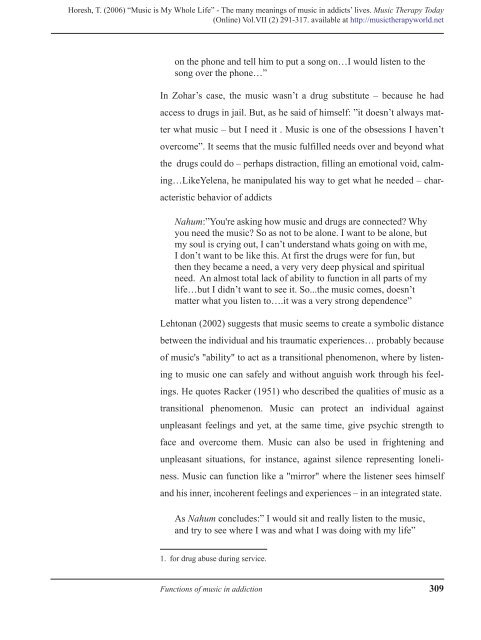Music Therapy Today - World Federation of Music Therapy
Music Therapy Today - World Federation of Music Therapy
Music Therapy Today - World Federation of Music Therapy
You also want an ePaper? Increase the reach of your titles
YUMPU automatically turns print PDFs into web optimized ePapers that Google loves.
Horesh, T. (2006) “<strong>Music</strong> is My Whole Life” - The many meanings <strong>of</strong> music in addicts’ lives. <strong>Music</strong> <strong>Therapy</strong> <strong>Today</strong><br />
(Online) Vol.VII (2) 291-317. available at http://musictherapyworld.net<br />
on the phone and tell him to put a song on…I would listen to the<br />
song over the phone…”<br />
In Zohar’s case, the music wasn’t a drug substitute – because he had<br />
access to drugs in jail. But, as he said <strong>of</strong> himself: ”it doesn’t always mat-<br />
ter what music – but I need it . <strong>Music</strong> is one <strong>of</strong> the obsessions I haven’t<br />
overcome”. It seems that the music fulfilled needs over and beyond what<br />
the drugs could do – perhaps distraction, filling an emotional void, calm-<br />
ing…LikeYelena, he manipulated his way to get what he needed – char-<br />
acteristic behavior <strong>of</strong> addicts<br />
Nahum:”You're asking how music and drugs are connected? Why<br />
you need the music? So as not to be alone. I want to be alone, but<br />
my soul is crying out, I can’t understand whats going on with me,<br />
I don’t want to be like this. At first the drugs were for fun, but<br />
then they became a need, a very very deep physical and spiritual<br />
need. An almost total lack <strong>of</strong> ability to function in all parts <strong>of</strong> my<br />
life…but I didn’t want to see it. So...the music comes, doesn’t<br />
matter what you listen to….it was a very strong dependence”<br />
Lehtonan (2002) suggests that music seems to create a symbolic distance<br />
between the individual and his traumatic experiences… probably because<br />
<strong>of</strong> music's "ability" to act as a transitional phenomenon, where by listen-<br />
ing to music one can safely and without anguish work through his feel-<br />
ings. He quotes Racker (1951) who described the qualities <strong>of</strong> music as a<br />
transitional phenomenon. <strong>Music</strong> can protect an individual against<br />
unpleasant feelings and yet, at the same time, give psychic strength to<br />
face and overcome them. <strong>Music</strong> can also be used in frightening and<br />
unpleasant situations, for instance, against silence representing loneli-<br />
ness. <strong>Music</strong> can function like a "mirror" where the listener sees himself<br />
and his inner, incoherent feelings and experiences – in an integrated state.<br />
As Nahum concludes:” I would sit and really listen to the music,<br />
and try to see where I was and what I was doing with my life”<br />
1. for drug abuse during service.<br />
Functions <strong>of</strong> music in addiction 309

















